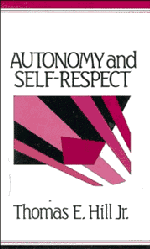Book contents
- Frontmatter
- Contents
- Sources and acknowledgments
- Introduction
- 1 Servility and self-respect
- 2 Self-respect reconsidered
- 3 Autonomy and benevolent lies
- 4 The importance of autonomy
- 5 Symbolic protest and calculated silence
- 6 Moral purity and the lesser evil
- 7 Self-regarding suicide: a modified Kantian view
- 8 Ideals of human excellence and preserving natural environments
- 9 Weakness of will and character
- 10 Promises to oneself
- 11 Social snobbery and human dignity
- 12 Pains and projects: justifying to oneself
- 13 The message of affirmative action
- Index
Introduction
Published online by Cambridge University Press: 05 June 2012
- Frontmatter
- Contents
- Sources and acknowledgments
- Introduction
- 1 Servility and self-respect
- 2 Self-respect reconsidered
- 3 Autonomy and benevolent lies
- 4 The importance of autonomy
- 5 Symbolic protest and calculated silence
- 6 Moral purity and the lesser evil
- 7 Self-regarding suicide: a modified Kantian view
- 8 Ideals of human excellence and preserving natural environments
- 9 Weakness of will and character
- 10 Promises to oneself
- 11 Social snobbery and human dignity
- 12 Pains and projects: justifying to oneself
- 13 The message of affirmative action
- Index
Summary
These essays concern moral questions that virtually everyone faces in daily life, not specialized topics that arise only in the particular professions or in academic philosophical debates. Discussion typically begins with specific cases. Some are dramatic, and others quite familiar; but all of the examples raise recurring moral perplexities. Though practically important and theoretically interesting, many of these issues have been relatively neglected in recent philosophical literature.
Work on large scale moral problems such as nuclear war, famine, distributive justice, punishment, population control, and animal rights has been important and should continue, but here I focus primarily on moral attitudes, virtues, and vices that are especially important to personal relations and to how one views oneself. Philosophical works that address these last issues are not so common, and typically they start from an antecedent commitment to a particular ethical theory, such as utilitarianism or Thomism. In contrast, I raise the issues by describing concrete examples and exploring a variety of alternative perspectives, always seeking to articulate the ideals and principles that lie behind dissatisfaction with the answers generated by “applying” familiar theories. The positions that I explore are often “Kantian” in spirit, but there is no attempt here to do textual exegesis or to crank out solutions from Kant's theory.
My topics range widely, but there are common themes. The opening essays deal explicitly with the requirements of self-respect, one arguing that servility is incompatible with a certain ideal of self-respect and the other calling attention to the demands of a further conception of self-respect.
- Type
- Chapter
- Information
- Autonomy and Self-Respect , pp. 1 - 3Publisher: Cambridge University PressPrint publication year: 1991

